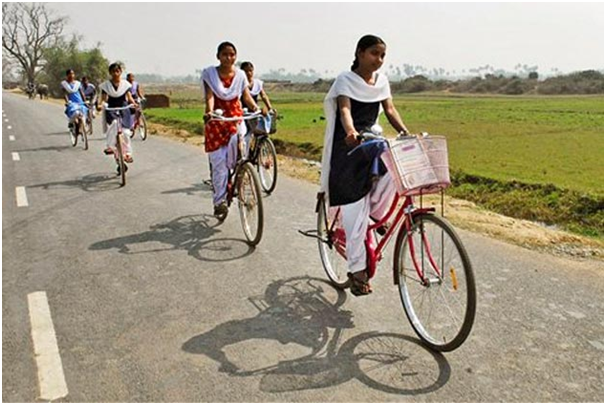Bihar’s Potential to be a Turning Point in National Politics
Common sight in Bihar today: Girls cycling to schools and colleges across the state;

PATNA: The Bihar electoral verdict has the potential of proving to be a turning point in the national politics. Those who lost out are seeking to minimise its importance, terming it to be a mere case of getting the electoral arithmetic wrong. Such logic is self-serving and tautological.
The two main achievements of BJP in the 2014 General Elections were (i) Total appropriation of the Development Discourse and (ii) Lending a measure of legitimacy to the majoritarian communal agenda. The challenge posed by this outcome can not be successfully met only by re-proclaiming the secular slogan and by mechanically piecing together the ‘secular vote’. The task called for exposing the hollowness of the ruling discourse on development and building up an alternative, pro-people development agenda centred on land. peasantry, employment and economic and social security.
The Bihar elections have shown that the BJP’s appropriation of the development discourse can be challenged successfully. More important, the elections have loudly proclaimed that the majoritarian communal agenda of BJP has no legitimacy in the eyes of the vast masses of Bihar.
Clearly, the development agenda put forward by ‘the grand alliance’ was backed by concrete achievements in terms of vastly improved electricity availability , noticeable improvement in road connectivity, greater political and economic opportunities for womenfolk, special measures for encouraging girl children to pursue education, and a clear message of inclusive growth, particularly for the disadvantaged social sections. It did not promise a radical alternative framework comprehending basic issues of land, peasantry and employment. Even in regard to commodification of education and health, it did not promise any radical departure. However, even this modest version triumphed over the pie –in –the- sky promise of “lakhs of crores”in a special package and abstract claims of high rates of growth in GDP. In their guts, ordinary people knew that a bird in hand was better than two in the bush. They valued equity aspect of the growth far more than its promised undifferentiated acceleration. And here lies the key to their unambiguous verdict.
Even the corporate sector was apprehensive about the likely negative impact of ascending divisive politics of the ruling party. They were worried about the prospects for inflows of foreign capital. Even more, they were worried about the long term environment for profitability. So the rank communal propaganda that surfaced in the later phases of the elections rattled them. But their worries had little direct impact on the electorate which was far more conscious of the disastrous immediate effects of communalization of polity and society. And they took care that the sinister design was nipped in the bud. There was no communal incident in the prolonged period of campaigning despite repeated and brazen attempts on the part of the leaders of the contending combine to inject communal poison. Credit must go to the leaders of the grand alliance who constantly warned the people of Bihar of the looming danger of the communal propaganda and called for extra vigilance to avoid the trap being set up by the desparate communal elements. But, even more, the credit must go to the people of Bihar who not only saw through the sinister game but defeated it squarely without fuss, without bombast.
Two things emerge clearly. First, even in absence of a radical alternative development agenda, an unambiguous emphasis on equity aspect of growth and development can help handsomely in re-appropriating the development discourse. Delhi elections had partially underlined this aspect in terms of minimum economic and social security for the poor in general. But in Bihar elections, the issue came up starkly, as the very concept of preferential opportunity for the socially and educationally backward classes of the society was questioned by the BJP combine. Add to this the communal poisoning attempted by them. And the challenge became unmistakable: the values of equity and harmony were at stake. The Bihar electorate answered the call in their overwhelming and unambiguous electoral response.
Clearly, the magic of the legacy of the freedom struggle, the Idea of India, an egalitarian and inclusive India, continues to inspire the people at large, the poor and not so well- to- do who constitute the large majority. Moreover, the equity is far more important for them than the razzmatazz of abstract promise of accelerated growth.
Internal contradictions of the ruling paradigm of development perhaps do not seem to be equally apparent to the people at large. But rightly their concern is for equity and harmony which are but two sides of the same coin.
As the unerring logic of the ruling paradigm of development unfolds and sharpens the contradictions and inequity and disharmony accentuate, the disillusionment will mount. In order that this is not abused by the ruling classes to subvert the very process of democratization , the task before us is to elaborate the alternative pro-people agenda of development and help people internalize it. That implies the immediate step of giving a concrete shape to such an agenda in the context of Bihar. And the next immediate step is to take the Bihar wave beyond its borders. The task is analytical and political. This the praxis that Bihar results invoke.
(S.P.Shukla is a former Secretary to the Government of India)

